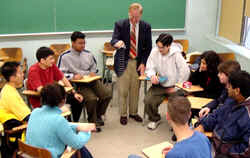Honors Courses
Honors Courses
Honors course sections typically cover the content of the course in greater depth, and are taught by faculty selected for their teaching talents. Honors courses are broadly available across the curriculum, including architecture, engineering, chemistry, computer science, English, history, economics, social sciences, marketing, management, mathematics, and physics. Honors courses are offered throughout the four-or five-year curriculum and include advanced courses in most majors. New honors courses and sections are continually being developed.
In their junior and senior years, Honors students choose from a variety of specialized honors courses. These include intermediate-level courses in Science, Technology and Society; History; and Management. Seniors enroll in an Honors-level research, project, or design course, in which, working independently with supervision by a faculty member of their choosing, they carry out a project that results in a publishable-quality report. Many students, in fact, publish or present their work at professional conferences. Honors students are also encouraged to take graduate courses and to work toward Master's or PhD degrees.
Non-Honors students are welcome to enroll in Honors courses in areas of their strength, with permission of the instructor or by meeting departmental requirements. The department offering the course must post a permit for the student to enroll.
 I was apprehensive at the start of my first semester in NJIT as an Albert Dorman’s Honors College student. Will these courses be overwhelmingly difficult? What will the professor expect of me? What if I fail? These questions were answered immediately as I entered my first class with Dr. Thomas in Physics-111H. Dr. Thomas made clear that the main objective of the course is to learn, but in order to achieve this goal, students must put time and effort into their work. In this course not only do we study the laws of mechanics, we also discover how these fundamentals apply to everything around us. I was apprehensive at the start of my first semester in NJIT as an Albert Dorman’s Honors College student. Will these courses be overwhelmingly difficult? What will the professor expect of me? What if I fail? These questions were answered immediately as I entered my first class with Dr. Thomas in Physics-111H. Dr. Thomas made clear that the main objective of the course is to learn, but in order to achieve this goal, students must put time and effort into their work. In this course not only do we study the laws of mechanics, we also discover how these fundamentals apply to everything around us.
Dr. Thomas began the course by analyzing the physics of a computer monitor. He demonstrated how the electrons striking the screen obey Newton’s Laws. Throughout the semester, the class continued to analyze technology ranging from water jets to accelerometers in cars. As a Computer Engineering major, these applications will be beneficial to my future. I was filled with anxiety as I began college. Now I realize that these courses are here to guide us, to prepare us for the future, and to enjoy as we learn. Paul Chao, Honors College Computer Engineering Major |
